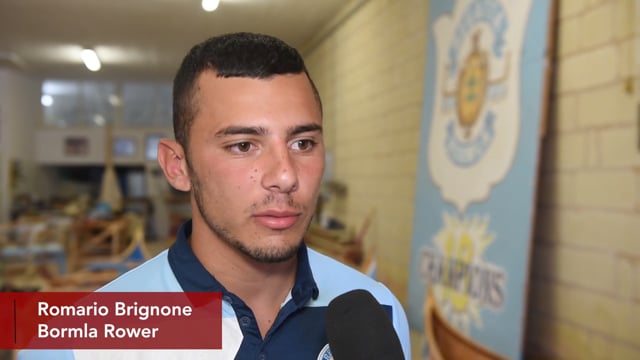[WATCH] Bormla’s young rowers hope to rekindle the regatta spark
The annual regatta boat races will be held on 8 September and Karl Azzopardi met 21-year-old Romario Brignone as he prepares for the big day


Regatta preparations are in full swing, as rowers, boat builders and club officials have their sights set on this year’s Victory Day races.
A tradition spanning back to the middle ages, the annual regatta race will be held on 8 September in what will be a five-hour spectacle of endurance in Valletta’s Grand Harbour.
But to be ready for the big day, rowers like Romario Brignone train all year round in the gym and at sea.
I met this 21-year-old at the Bormla regatta club, where Brignone is currently in the final stages of his preparation for the races that will pit seven localities against each other.

Six of these localities border the Grand Harbour, including the Three Cities.
On 8 September, teams of the best rowers will race in 10 different events under two categories, using traditional Maltese boats such as frejgatini, kajjiki, dgħajjes tal-pass and tal-midalji.
A native of Bormla, Brignone comes from a family of rowing enthusiasts and the love for the regatta has not been lost on him. “If you’re from Bormla, you are automatically drawn to the regatta. It’s something you can’t explain through words,” he told me as we strolled on the quay in his hometown.
An avid supporter of all things Bormla, Brignone’s passion for the regatta is a reminder of the enthusiasm that characterised these races in the 1980s.
People in the Three Cities would have, by now, been talking about the regatta, hedging their bets on who had the best teams and playing cassettes with music taunting rival supporters.

All this culminated on the day of the races, when throngs of flag-waving supporters would line the bastions and quays on either side of Grand Harbour to cheer on their rowers.
Brignone hopes the regatta will regain its former glory but dwindling support and diminishing interest from other clubs, looks to spell doom for the sport.
“The old ones around here tell us younger guys about the glory days of the sport back in the 1980s, when people from all over Malta came to see the rowers race,” he said.
If you really want to go for it, the club has to be ready to fork out at least €60,000 over a two-year span, and not all clubs can do that
Brignone has kept the tradition alive, being one of the youngsters taking the sport seriously. He hopes that children who frequent the Bormla Regatta Club warehouse, rekindle a bigger national interest in the sport.
The wooden racing boats are dwarfed by some of the super yachts that now grace Dockyard Creek. The 31 March races – the second appointment on the regatta calender – used to be held here before the creek became a yacht marina.
Bormla’s Regatta Club is found at the end of the creek, just off the historic Dock 1, which is now the centrepiece of an open space in the heart of the city.
Brignone explained that an intensive training regime is necessary for rowers to perform at their best on the day. The Bormla club provides its members with the necessary facilities and equipment to do so.
This is one club that is trying hard to keep the regatta tradition alive in a community that has retained a soft-spot for the traditional races.
Bormla Regatta Club President, Ivan Buttigieg, said financial demands keep increasing, making the tradition even harder to sustain.

“If you really want to go for it, the club has to be ready to fork out at least €60,000 over a two-year span, and not all clubs can do that,” he said.
Buttigieg, a former rower himself, said that the club tries to invest in its future by providing young children with outdated boats, to help them achieve the right technique.
Other former rowers, looking over the children, proceed to hand-pick those that have potential to go all the way.
Buttigieg appealed for a regatta museum, which he said should house traditional and famous boats from the different localities that compete.

“It’s a shame that we don’t have a place that houses such an important part of Maltese history,” he said.
The boats, which eventually become outdated because of sea water damage or prolonged use, are left for dead in the club’s warehouses.
Buttigieg said that in order for the sport to regain its former glory, those that hold the race close to their heart must engage in a collective effort.
“We who love the sport, must get together and see that the sport doesn’t die. It’s such a beautiful and spectacular sport, that it would be a shame to lose it,” Buttigieg said.
He appealed for everyone to attend the harbour races on 8 September. “It is important for the country to support tradition.”




.png)

















